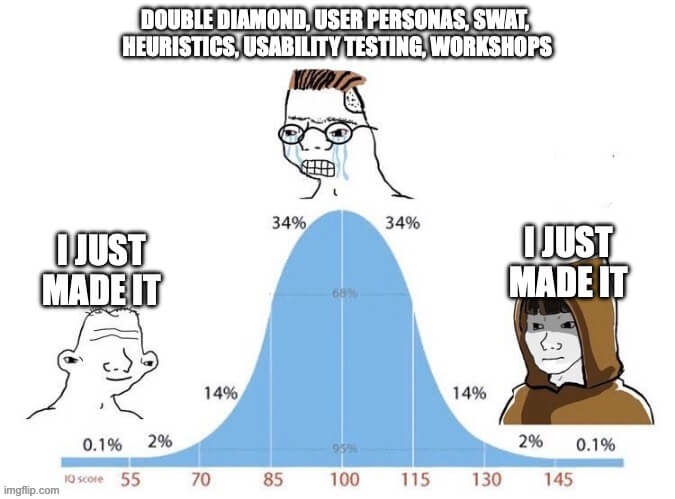
Design research is overrated
From most designers' point of view, every environment which doesn't let them go from 0 to 1 on a problem is perceived as hostile towards design. This is usually manifested as companies not allowing for a proper discovery phase within a project where designers can get acquainted with the problem space, or not allowing for a desired amount of exploration within execution before getting to a final solution.
What's the role of product designers, anyway?
Companies hire designers because they are good at making products for end users—because developers are not always good at that. This is an unpopular opinion, but designers are not a necessary actor in every product's lifecycle. So, there's that.
They also hire them because they can help them sell those products better. Sometimes they have to pay them while they are learning about what they do and who they do it for, but they should be doing so only when the product requires niche knowledge which the designer needs to possess in order to work on said product.
How many times have you worked on a product so weird and convoluted, that it required weeks, or months of research in order to understand it, understand who is it for, and be ready to do actual work? How many of those times was there no documentation, no materials you could learn from, or no one in the company who you could extract this information from? I'm guessing zero, if not it's very close to zero.
What is design research?
Extracting knowledge, browsing documentation, talking to people, being inquisitive and curious, drawing conclusions, and making mental maps all constitutes research.
This kind of research is always OK in my book. It's necessary to do in order to create good products.
However, what I have a problem with is Research—capital R. Designers usually perceive this kind of research as not just vital, but required before any work can be done.
Caveat: I believe even this Research—as it is perceived by the design purists—has its place.
I've personally conducted it and advocated for it, but the amount of times it's called for is laughably small. Designers keep pushing for it, because they think that that is how it's supposed to be done; you need to double diamond the shit out of every project you get on. You see it all over portfolios these days as well, every case study is almost a verbatim copy of every other case study, citing the exact same cookie-cutter process which we all know never happens in real life.
I'm not even kidding, but the design community is having the most middle-of-the-curve moment ever in 2024.
For some reason designers have a need to paint a picture of their participation in "perfect projects", probably thinking that will somehow summon them. I have gone through 100+ portfolios this year—it's a horrible year judging by how many designers are looking for a job—and I am baffled by the blandness, and sameness of most of the case studies. It's nauseating.
The truth is, most of us work on low-risk projects which constitute of very known human-computer interaction patterns.
How many times do you need to usability test a check-out flow? How many iterations do you need to go through in order to design a list of search results?
It's all been done to death. These are givens at this point in time, and have become patterns one should simply use and reuse. It's a part of your job as a designer to know, recognize, and use these patterns. Not question, and reinvent them every time!
The only time you should do any kind of Research—note the capital R—is when:
- there is no one to rely on for knowledge transfer, and nowhere to learn from,
- you are making something new, no one or very few people before have dealt with,
- you are unable to make a decision on a very impacting item within a larger context.
Oh, and you can figure out that you need to do Research because you will need a permission, or a budget for it. Everything else requires just enough research to keep the work moving.
What's this?
You are reading his blog.